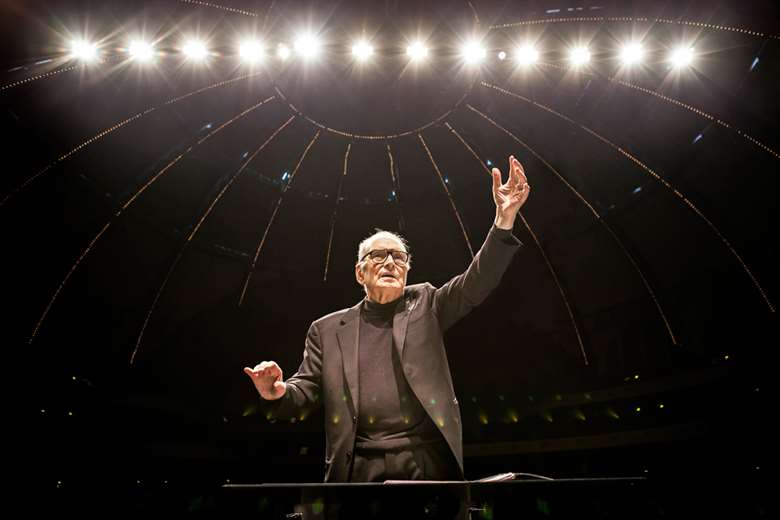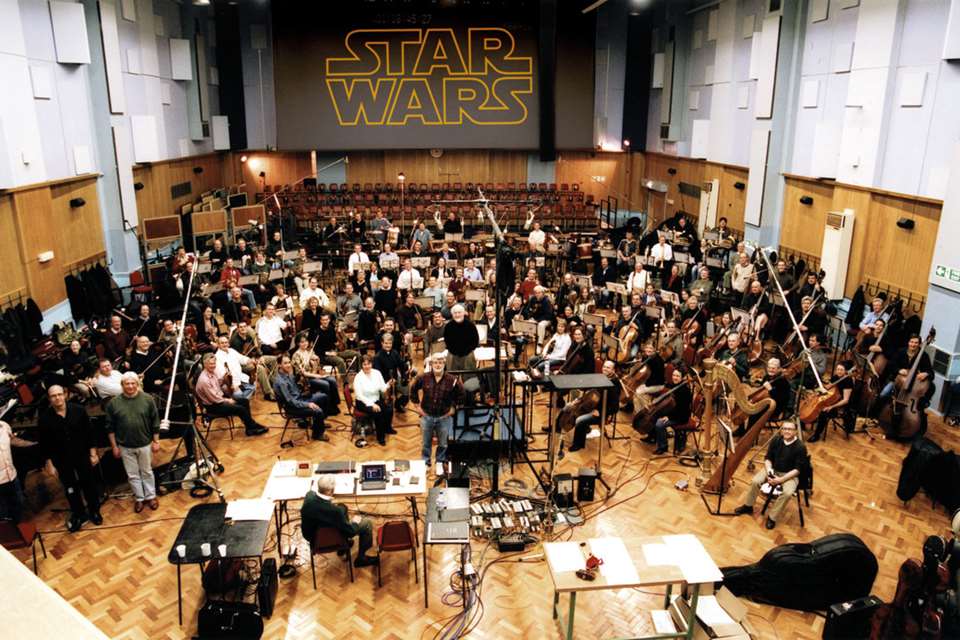Ennio Morricone – my inspiration, by Hans Zimmer
Gramophone
Monday, July 6, 2020
One of the world’s most successful film music composers, Hans Zimmer, reflects on what makes Ennio Morricone the greatest

Welcome to Gramophone ...
We have been writing about classical music for our dedicated and knowledgeable readers since 1923 and we would love you to join them.
Subscribing to Gramophone is easy, you can choose how you want to enjoy each new issue (our beautifully produced printed magazine or the digital edition, or both) and also whether you would like access to our complete digital archive (stretching back to our very first issue in April 1923) and unparalleled Reviews Database, covering 50,000 albums and written by leading experts in their field.
To find the perfect subscription for you, simply visit: gramophone.co.uk/subscribe
I grew up without television. My parents thought that television was the cultural devil and we shouldn’t have one at home. So I didn’t see any movies. I was about 12 when I snuck into the local cinema and saw Once Upon a Time in the West (1968). Not only was the film an overwhelming experience but the music completely got me and set me on my path and I knew what I wanted to do. That was really how I started becoming aware of Ennio Morricone. I saw all the Sergio Leone films; but then, after a while, it became more the case that I was listening to the music for its own sake, as opposed to seeing the film. I used to go and buy the soundtracks.
I grew up with Beethoven, Mahler and Brahms, and I’d suddenly discovered a composer who I thought was inventive and really influenced by Bach. If you listen to Once Upon a Time in the West there are many Bach influences and, actually, Mozart influences, too; he uses both styles so well and gives it completely his own voice. Analyse any one of Morricone’s pieces, look at the craftsmanship, at the inventiveness – it is absolutely on par with Bach. He is the master.
I’ve always loved Morricone’s work ethic, just as I’ve always loved his aesthetic sense. It feels like we come from the same direction. Morricone doesn’t often start without having a good tune and, as I learnt from the film composer Stanley Myers, without a melody you have nothing.
Parallel paths
I haven’t seen Ennio for ages because we are both working all the time, but we had a truly amazing moment. We were both in Bonn coincidentally and we ended up meeting at the Beethoven house, so that was a defining moment in my life: being at the Beethoven house, having Ennio Morricone explain the scores to me. That was a pretty great day.
Both Ennio and I have tried to experiment with sounds, to experiment with orchestrations and just the sheer joy of having a group of musicians around us who we repeatedly work with, which is obviously very much the case with him. I think there are similarities in that we both started in European movies where we never had a huge budget, so we had to really use the musicians that we knew were good and make them count, as opposed to being able to have a huge Hollywood-style orchestra. And later on we did both get to work with huge, Hollywood-style orchestras, and then, in a funny way, I think, went back to working with smaller sections because it was more enjoyable and more personal.
We are a generation apart but, at the same time, we are of the era where recording became an art form. Ennio’s sound is determined to a great extent by the studio he’s recording in and the players he’s working with. Part of it is to figure out how to push the technology – and by “technology” I don’t just mean what people perceive as recording technology. A cello is a piece of technology – you sit there with your player and you figure out how he can make sounds that nobody ever heard out of a cello.
A western revolution
Morricone brought the electric guitar to the western. The great thing, though, about the electric guitar in the western is that of course there were no electric guitars, so it’s completely anachronistic – but somehow Ennio did it so committedly that nobody ever questioned it. It was only much later people started to say, “How come there’s an electric guitar in there?” He needed that sound to show the grit and the machismo of those characters. There really is no other sound that can do it as well as an electric guitar, so, like the movies themselves, he took the zeitgeist of the late ’60s and put it into the 19th century.
In A Fistful of Dynamite (aka Duck, You Sucker, aka Once Upon a Time in the Revolution, 1971) there’s a track called “The March of the Beggars”. It’s absolutely a lesson in great orchestration and what you can do if you have really committed players. First of all, those notes wouldn’t have been written if Ennio hadn’t known that the collaboration between him and his musicians was going to be extraordinary, because none of the parts in there are for timid players. It starts off with a burp on a bassoon – it’s right in your face, it’s the rudest noise you’ve ever heard – and it’s not until the very end that the whole thing becomes more symphonic. Instead of using reverb he’s bringing in a church organ, and so it’s the sound of an organ in a church that provides the reverb. It’s a piece of music that just develops from a single instrument to everything.
It has a really great shape, especially from a sonic perspective. To use perspective in music, that’s what Mahler was hoping for in his Second Symphony, taking players out of the orchestra and putting them behind it, or on the balcony. Suddenly we could do that with recording. With films being in 5.1, everybody who’s very excited about 3D film forgets that music’s been 3D for rather a long time. Even in the ’60s when it was just mono, Ennio could still play with perspective, still play with the sense of depth just by having microphones set up in different places.
Imagining America
There is a direct line between Kurt Weill and Morricone. I am sure there will still be snobs who will consider Kurt Weill a music-hall composer – that’s semantics – but both composers have dealt with an America which doesn’t really exist, a Brechtian America, in their compositions time and time again. Even in films like The Untouchables, Ennio Morricone is still looking at America and hearing America with an Italian ear, seeing it through Italian eyes.
In Once Upon a Time in America (1984) he plays an amazing trick. You go into the train station in the 1920s and you hear a Dixieland jazz band, and as the camera pulls back the band plays “Yesterday” by Paul McCartney, and you go, “Hang on, this is all wrong, this is the ’20s”, and you are in the ’60s as you pull out of the shot. They must have had so much fun thinking that one up. But the job of an artist is to be a moment ahead of the zeitgeist, and you do something new and people can’t quite feel it yet. Just like Once Upon a Time in America, which was then very quickly put back into Leone’s chronology, it just takes people a second. They are shocked when they encounter something new – but a little bit of confusion is a good thing.
And that’s how composers work. By throwing ideas around and being confused, and then finding a structure in which to put that confusion. And confusion is good in music. Ennio has done a lot of really interesting, avant-garde, aleatoric things. He doesn’t shy away from any of that, he doesn’t shy away from demanding a certain commitment from the audience. It’s not all pretty. It gets under your skin. A lot of his music is very provocative, and the sounds are provocative and have an edge to them. One of the best scores Ennio ever wrote was for Bullworth (1998). The whole movie is rap music, then suddenly he gets you with the first note. With the first note of the strings, he literally transports you. And Warren Beatty knew that he could only get that out of Ennio Morricone – there wasn’t another composer who would be able to pull that one off.
Paying homage and having fun
The thing about Ennio, and this goes for most musicians and composers, is that the operative word in music is “playing” – it’s to do with not growing up and not getting old and not losing your sense of curiosity and your sense of experimentation.
My score for Broken Arrow (1996) was really a homage to the guitarist that Ennio used, because I always thought he was trying to sound like Duane Eddy. I thought, I’ll get the real guy. Part of it is that composers over the centuries have all tried to write a homage to Bach one way or the other, and Ennio has done many of those. In a way it’s not just giving homage to Ennio but a homage to that sort of harmonic sense as well, where you are suddenly going into some very nice Bach territory. It’s just great fun to write.
We love what we do and for us it’s fun, it’s not always serious. I think the misinterpretation of a composer’s mission is still formed by having read too many interviews with the European avant-garde. Music is supposed to be fun, music is supposed to be something that you enjoy doing. Listen to Bernstein, listen to him speak, it’s the serious business of joy. In my soundtrack to Pirates of the Caribbean: At World’s End there’s one cue which is essentially a riff on “Man with a Harmonica” from Once Upon a Time in the West. That’s definitely having fun, and it is a Bach bass-line with a bit of Mozart’s Requiem on top.
A place in history
Ennio Morricone is the singular talent of the 20th century, as far as film music is concerned. There is nobody else. There are other styles. There’s John Williams, of course. There’s Erich Korngold. There’s Bernard Herrmann. There are a handful of great composers. But Ennio for me personally is so above everybody. His inventiveness and his gracefulness and his daring, and at the same time the emotionality, the core truth in his music, the true heart. Which other composer reveals as much about their own heart as Ennio Morricone does?
His music is so intensely personal and seems to speak to the individual. Much more than grand pieces that seem to speak to a crowd of people, each piece Morricone writes seems to be personal to the individual listening to it, and that’s a really amazing achievement. That’s part of the reason why people want to listen to his music more and more – because the message is usually humble and there are beautiful tunes beautifully executed with great technique. It’s just that way when Alfred Brendel plays a Beethoven sonata, it’s that sort of thing where he directly reaches across to the listener. That’s his strength. That’s really the power of his music. You get to hear the man himself. You don’t get to hear the technique. The technique becomes irrelevant, and what really happens with Morricone is that he’s got the courage to let you look inside him and let you see his most vulnerable and personal feelings. And that trust he has in you as an audience, that takes a lot of courage. I think, in a funny way, by loving Morricone we acknowledge our respect for the trust he gives us. I think as long as Ennio is alive and well, film music is alive and well. And I think at the moment film music actually is very much alive and well.










